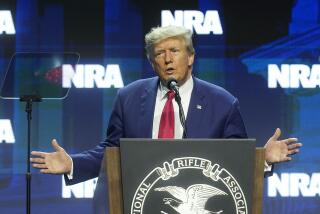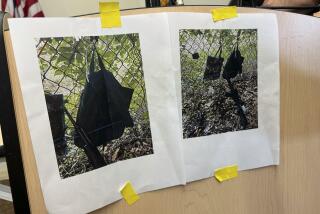Analysis: Reaction to shooting at congressional baseball practice reveals a nation that doesn’t just disagree. It hates
Reporting from Washington — The targeted shooting of Republican lawmakers at play yielded a kaleidoscope of emotions Wednesday — anger, revulsion, horror — but little in the way of surprise.
The attack almost seemed a natural, if sick, extension of the virulence that surrounds the country’s increasingly tribal politics.
As if to prove it, events quickly settled into a familiar pattern: finger-pointing, blame-laying, partisan positioning. People today don’t just disagree. They’ve grown to hate the other side, from President Trump on down.
Not necessarily over issues or ideology, which can be debated or leavened by compromise. But rather as an outgrowth of a deeper pathology, a contempt toward people for merely existing.
“It’s hard to suggest it’s an ideological conflict,” as if, say, the abortion issue has suddenly grown more heated, said Marc Hetherington, a political science professor at Vanderbilt University. “What it’s all about is bad feelings.”
He cited studies showing Republicans say they hate Democrats more than they hate atheists, and Democrats hate Republicans more than they despise religious fundamentalists.
Both sides, he said, hate the other more than they hate “illegal immigrants,” the inflammatory phrase used to gauge respective animosities.
The overwhelmingly majority of people, of course, don’t take up weapons to vent their anger as did gunman James T. Hodgkinson, a supporter of independent Vermont Sen. Bernie Sanders and a fierce Trump critic.
In the aftermath of Wednesday’s brutality there were many instances of grace, not least from those most directly affected.
“We don’t shed our humanity when we enter this chamber,” House Speaker Paul D. Ryan of Wisconsin said in a moving oration on the House floor. “For all the noise and fury, we are one family.”
San Francisco’s Nancy Pelosi, the leader of House Democrats, responded, “On days like today, there are no Democrats or Republicans, only Americans united in our hopes and prayers for the wounded.”
The coming-together recalled a similarly transcendent moment after the Sept. 11 terrorist attacks, when members of Congress, Democrat and Republican, ventured to the steps of the Capitol and side by side delivered a spontaneous rendering of “God Bless America.”
But that brief harmony proved a mere pause as the country descended into an even deeper slough of animosity and political loathing.
Similarly, the high-flown words of party leaders were quickly and loudly drowned out Wednesday by partisans grasping for tactical advantage.
Among them was the president’s son, Donald Trump Jr., who used Twitter to link the shootings to a controversial New York production of “Julius Caesar,” in which a presidential doppelganger is murdered onstage.
“Events like today are EXACTLY why we took issue with NY elites glorifying the assassination of our President,” commentator Harlan Hill wrote in a Tweet the younger Trump amplified by sharing with 1.7 million Twitter followers.
“The Left in this country is ushering in a new #CultureofViolence where violent hate is the new normal,” tweeted Bill Mitchell, a pro-Trump radio host. “#DomesticTerrorists,” he added.
On the Democratic side, some more virulent partisans openly celebrated the critical wounding of Rep. Steve Scalise, the No. 3 Republican in the House leadership, or summoned eye-for-an-eye memories of the hatred directed at President Obama and his supporters. (A number of Democratic lawmakers reported receiving death threats immediately after the attack.)
We don’t shed our humanity when we enter this chamber. For all the noise and fury, we are one family.
— House Speaker Paul D. Ryan
The junior Trump’s tweet drew a string of angry rejoinders:
“Did you have a problem when [candidate Trump] said ‘I could shoot someone on Fifth Ave. and my approval would go up’?”
“Or when Trump advocated violence at rallies to show people a lesson? Lol”
“Trump is a major contributor [to] the type of violence that led to this in the first place.”
The president, for his part, responded with a call for national unity, a show of equanimity in notable contrast to his stance during the campaign, when he sometimes encouraged violence and, at one point, seemed to invite opponents to take up arms against Democratic rival Hillary Clinton.
While many were quick to blame Trump for Wednesday’s violence — just as they implicated him after a Republican congressional candidate body-slammed a reporter for asking about healthcare — it’s not as though he overnight transformed a nation bathed in love and light.
“It’s been building and building,” said Hetherington, who has written extensively on the country’s polarization.
He cited the pugnacious Newt Gingrich, who in 1994 broke a 40-year Democratic stranglehold on the House by shattering the ordered rules of engagement and urging acolytes to tar their opponents with words like “corrupt,” “pathetic” and “traitor.” (On Thursday, the former House speaker tweeted a link to Ryan’s speech and the quote “an attack on one of us is an attack on all of us.”)
The contagion spread well beyond the Capitol in the aftermath of the fiercely disputed 2000 presidential campaign, which ended in an effective tie broken by a partisan 5-4 Supreme Court decision. It deepened with the antagonism directed at President George W. Bush and, as though to outdo the hostility, the contempt aimed at his successor, President Obama.
David Axelrod, who helped steer Obama to the White House, said Trump must shoulder some blame for the country’s growing chasm. Ultimately, though, he said it was the voters who must take responsibility.
“In our democracy, it’s not just up to the leaders to decide what our politics is going to be like. It’s also up to the citizens,” said Axelrod, who now lectures on politics at the University of Chicago, in Obama’s old hometown. It remains to be seen, he continued, whether the Virginia assault would be jarring enough “that politicians start paying a penalty for this kind of blood-sport approach.”
He didn’t hold out much hope, however, echoing others believing a sad and sick political culture on Wednesday grew just a little sadder and sicker.
Times staff writer Michael Finnegan contributed to this report.
ALSO
Heartbreak on the baseball field: What the annual game means to Congress
Gunman who opened fire at GOP baseball practice was a Bernie Sanders supporter from Illinois
Virginia shooting: Members of Congress have been targets of attacks in the past
More to Read
Get the L.A. Times Politics newsletter
Deeply reported insights into legislation, politics and policy from Sacramento, Washington and beyond. In your inbox three times per week.
You may occasionally receive promotional content from the Los Angeles Times.











